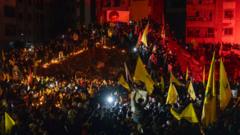In a dramatic expression of grief and solidarity, thousands of people descended on the site of Hassan Nasrallah's assassination, marking for the first time public access to the area since the event. The massive crater left by an Israeli airstrike, which killed the former Hezbollah leader on September 27, was illuminated in red and surrounded by Hezbollah flags, creating a stark visual symbol of both loss and defiance.
As night fell, torches illuminated the scene, where men, women, and children expressed their sorrow and respect for a leader who had guided Hezbollah for over three decades, solidifying its substantial presence in Lebanon and the region. Chants of “At your service, Nasrallah” reverberated through the crowd, illustrating the deep emotional connection many have to the former leader.
Previously, access to the southern suburb known as Dahieh, where Nasrallah was killed, had been tightly controlled by Hezbollah. The recent ceasefire agreement with Israel opened the area, creating space for mourning and remembrance. Eyewitness accounts described the scene as both heart-wrenching and powerful; many supporters held candles and images of Nasrallah, embodying their enduring loyalty.
"I can't believe he is gone. We waited so long to come here to feel close to him," expressed a tearful Narjis Khshaish, age 31. Others echoed her sentiments, suggesting Nasrallah's death would serve as inspiration for continued resistance against Israeli actions. “His legacy will continue,” stated Moussa Dirani, who attended with his son, emphasizing the sentiment that the movement transcends individual leadership.
Interestingly, although Nasrallah's assassination is a critical loss for Hezbollah, analysts point out that the group's longstanding achievements in maintaining its military operations against Israel, as well as its impact on the Israeli economy, still resonate strongly with its support base. Many in the crowd expressed determination to carry forward Nasrallah’s vision, affirming that their ideological commitment would remain unwavering.
As Hezbollah navigates the aftermath of this loss amid continued hostilities, the essence of these memorial gatherings— characterized by strong communal emotions and affirmations of identity—points to a complex narrative woven through notions of resilience and ongoing conflict in the region.
The repercussions of Nasrallah's assassination will no doubt shape the future dynamics between Hezbollah and Israel, and the sentiment shared during this memorial could influence the broader political landscape in Lebanon as Hezbollah seeks to maintain its influence in the volatile Middle East context.
As night fell, torches illuminated the scene, where men, women, and children expressed their sorrow and respect for a leader who had guided Hezbollah for over three decades, solidifying its substantial presence in Lebanon and the region. Chants of “At your service, Nasrallah” reverberated through the crowd, illustrating the deep emotional connection many have to the former leader.
Previously, access to the southern suburb known as Dahieh, where Nasrallah was killed, had been tightly controlled by Hezbollah. The recent ceasefire agreement with Israel opened the area, creating space for mourning and remembrance. Eyewitness accounts described the scene as both heart-wrenching and powerful; many supporters held candles and images of Nasrallah, embodying their enduring loyalty.
"I can't believe he is gone. We waited so long to come here to feel close to him," expressed a tearful Narjis Khshaish, age 31. Others echoed her sentiments, suggesting Nasrallah's death would serve as inspiration for continued resistance against Israeli actions. “His legacy will continue,” stated Moussa Dirani, who attended with his son, emphasizing the sentiment that the movement transcends individual leadership.
Interestingly, although Nasrallah's assassination is a critical loss for Hezbollah, analysts point out that the group's longstanding achievements in maintaining its military operations against Israel, as well as its impact on the Israeli economy, still resonate strongly with its support base. Many in the crowd expressed determination to carry forward Nasrallah’s vision, affirming that their ideological commitment would remain unwavering.
As Hezbollah navigates the aftermath of this loss amid continued hostilities, the essence of these memorial gatherings— characterized by strong communal emotions and affirmations of identity—points to a complex narrative woven through notions of resilience and ongoing conflict in the region.
The repercussions of Nasrallah's assassination will no doubt shape the future dynamics between Hezbollah and Israel, and the sentiment shared during this memorial could influence the broader political landscape in Lebanon as Hezbollah seeks to maintain its influence in the volatile Middle East context.
















